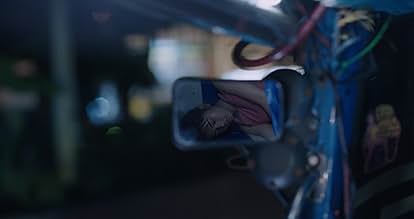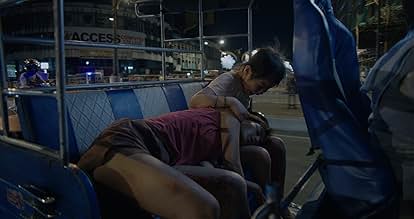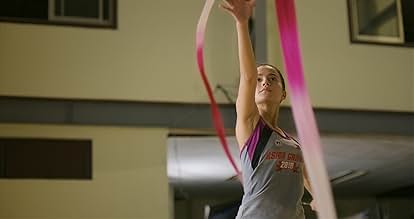Añade un argumento en tu idiomaIt follows a young gymnast who discovers she is pregnant on the week of the national team tryouts. On her way to a seller of illegal abortion drugs, she meets a mysterious girl who eerily ta... Leer todoIt follows a young gymnast who discovers she is pregnant on the week of the national team tryouts. On her way to a seller of illegal abortion drugs, she meets a mysterious girl who eerily talks and thinks like her.It follows a young gymnast who discovers she is pregnant on the week of the national team tryouts. On her way to a seller of illegal abortion drugs, she meets a mysterious girl who eerily talks and thinks like her.
- Dirección
- Guión
- Reparto principal
- Premios
- 1 premio y 1 nominación en total
Reseñas destacadas
This is the sunshine the country needs in today's climate.
It was Jadaone's courage that popped in my head when the title card flashed, a very Filipina name that connotes brightness and warmth - two things the film was not intended for, two things the titular character deprived of.
Sunshine is a story of every Sunshine, a Filipino woman vulnerable to systemic injustice and oppression; a story no one could have been told better than a Filipino woman herself - and a fearless and intelligent one at that. From reproductive health and general health care system to conservatism, Jadaone's care and spirit championed. Her personification of one's conscience was beautifully done. I sobbed through the last 15 minutes.
True-to-life darkness in the country executed from the literal streets to the contexts of quality of life through Orendain's realism. There's a harrowing frame in the movie that ticked all my boxes as a fan of dark cinematography. I bled in the dark with Sunshine right there.
This film boasts a talented bundle of actresses: Meryll Soriano, Annika Co, Xyriel Manabat, Jennica Garcia, with Maris Racal tying the ribbon, flexing her acting muscles across different tones and needs. Well-written and well-directed performances with standouts coming from Garcia, Co, and Racal. Ah, women.
Malalim. Matapang. Mahalaga. Hindi ako babae pero gets na gets kita, Sunshine.
It was Jadaone's courage that popped in my head when the title card flashed, a very Filipina name that connotes brightness and warmth - two things the film was not intended for, two things the titular character deprived of.
Sunshine is a story of every Sunshine, a Filipino woman vulnerable to systemic injustice and oppression; a story no one could have been told better than a Filipino woman herself - and a fearless and intelligent one at that. From reproductive health and general health care system to conservatism, Jadaone's care and spirit championed. Her personification of one's conscience was beautifully done. I sobbed through the last 15 minutes.
True-to-life darkness in the country executed from the literal streets to the contexts of quality of life through Orendain's realism. There's a harrowing frame in the movie that ticked all my boxes as a fan of dark cinematography. I bled in the dark with Sunshine right there.
This film boasts a talented bundle of actresses: Meryll Soriano, Annika Co, Xyriel Manabat, Jennica Garcia, with Maris Racal tying the ribbon, flexing her acting muscles across different tones and needs. Well-written and well-directed performances with standouts coming from Garcia, Co, and Racal. Ah, women.
Malalim. Matapang. Mahalaga. Hindi ako babae pero gets na gets kita, Sunshine.
We watched Sunshine yesterday, July 24, during the block screening at SM Megamall. I had seen the trailer beforehand, so I knew we were in for something bold, something necessary. But I wasn't prepared for how deeply it would sit with me long after the credits rolled.
I didn't cry while watching the film, but once it ended, I found myself overwhelmed. The weight of Sunshine doesn't hit all at once - it lingers, it settles. And it stays.
At its core, Sunshine is the story of a woman taking control of her body in a society that keeps telling her she isn't allowed to. It's not simply about one choice, one moment, or one woman. It's about the collective experience of many Filipinas who navigate a system that consistently fails to hear them.
Antoinette Jadaone's direction doesn't shy away from discomfort. She faces it head-on, inviting the audience to confront the silences we've learned to live with - about abortion, reproductive rights, the stigma around sexuality, and the lack of access to informed sex education in the Philippines.
Sunshine is timely, urgent, and painfully real. It gives voice to the cry of our generation, echoing the need for progressive reforms that protect women and children. The film challenges its viewers not just to empathize, but to act.
As a viewer, I left the cinema not only moved, but also awakened. Sunshine isn't here to entertain. It's here to disturb, to provoke, and to push us into uncomfortable yet necessary conversations.
To my fellow Filipinos: let's not turn away. Let's create spaces where women can speak freely, where choices about their bodies are met with compassion, not judgment. Let's demand that our lawmakers stop treating reproductive health as taboo.
To filmmakers and storytellers: keep telling these stories. We need more films like Sunshine-bold, unapologetic, and grounded in truth. The personal is political, and cinema has the power to move both heart and policy.
Let Sunshine be a beginning. Let it be a spark. And let's keep the conversation going.
I didn't cry while watching the film, but once it ended, I found myself overwhelmed. The weight of Sunshine doesn't hit all at once - it lingers, it settles. And it stays.
At its core, Sunshine is the story of a woman taking control of her body in a society that keeps telling her she isn't allowed to. It's not simply about one choice, one moment, or one woman. It's about the collective experience of many Filipinas who navigate a system that consistently fails to hear them.
Antoinette Jadaone's direction doesn't shy away from discomfort. She faces it head-on, inviting the audience to confront the silences we've learned to live with - about abortion, reproductive rights, the stigma around sexuality, and the lack of access to informed sex education in the Philippines.
Sunshine is timely, urgent, and painfully real. It gives voice to the cry of our generation, echoing the need for progressive reforms that protect women and children. The film challenges its viewers not just to empathize, but to act.
As a viewer, I left the cinema not only moved, but also awakened. Sunshine isn't here to entertain. It's here to disturb, to provoke, and to push us into uncomfortable yet necessary conversations.
To my fellow Filipinos: let's not turn away. Let's create spaces where women can speak freely, where choices about their bodies are met with compassion, not judgment. Let's demand that our lawmakers stop treating reproductive health as taboo.
To filmmakers and storytellers: keep telling these stories. We need more films like Sunshine-bold, unapologetic, and grounded in truth. The personal is political, and cinema has the power to move both heart and policy.
Let Sunshine be a beginning. Let it be a spark. And let's keep the conversation going.
10Vee-031
The performances are outstanding, with the lead actress delivering a raw and emotional portrayal of Sunshine's struggles. The supporting cast adds depth to the story, particularly the little girl, who brings a sense of wonder and curiosity to the film.
One of the most striking aspects of "Sunshine" is its refusal to provide easy answers. The film presents a realistic portrayal of the complexities surrounding reproductive choices, leaving viewers to ponder the moral implications.
One of the most striking aspects of "Sunshine" is its refusal to provide easy answers. The film presents a realistic portrayal of the complexities surrounding reproductive choices, leaving viewers to ponder the moral implications.
Maris Racal delivers an incredibly raw and grounded performance. You feel her tension, her fear, her hope and the heartbreak that comes from making an impossible decision. She doesn't ask you to agree with her character. She just asks you to understand. And that's powerful.
Direk Tonet Jadaone has once again proven her gift for telling stories that cut deep. This film doesn't shout, but it lingers. It haunts you in the quiet moments. It reflects a reality many would rather not see one where shame is louder than support, and judgment comes faster than help.
Direk Tonet Jadaone has once again proven her gift for telling stories that cut deep. This film doesn't shout, but it lingers. It haunts you in the quiet moments. It reflects a reality many would rather not see one where shame is louder than support, and judgment comes faster than help.
Sunshine is on the verge of joining the national gymnastics team and going to the Olympics, when she loses focus, careens off balance, and falters. Dreams nearly in her grasp shift to distant phantoms as she realizes she is pregnant. Shaken, fearful, desperate, and determined not to lose her rightful place on the national team, Sunshine searches the underground of the city for abortifacients. Abortion and even divorce are illegal in the Philippines, so Sunshine has few options and few people she can trust. Just then a mysterious young girl appears in the darkness and crowded streets with knowledge of Sunshine's heart that surprises her and touches her deeply.
"I wanted to be brave for these girls," said Maris Racal (Sunshine) "who have no one else to turn to." Racal is intrinsically believable in her role. In the conservative religious culture of the Philippines and with the lack of access to reproductive support, many girls are in crisis. The issue is relatable and timely not just in the Philippines, but in many other countries including, unfortunately, our own.
At this world premiere screening at the Toronto International Film Festival, director Antoinette Jadaone said she got the idea for an imaginary friend from the film Jojo Rabbit. As part of her film research Jadaone interviewed girls who had abortions. She hopes the film sparks conversations and change, that it is part of the solution for the country, and helps girls in such situations make their own decisions.
"I wanted to be brave for these girls," said Maris Racal (Sunshine) "who have no one else to turn to." Racal is intrinsically believable in her role. In the conservative religious culture of the Philippines and with the lack of access to reproductive support, many girls are in crisis. The issue is relatable and timely not just in the Philippines, but in many other countries including, unfortunately, our own.
At this world premiere screening at the Toronto International Film Festival, director Antoinette Jadaone said she got the idea for an imaginary friend from the film Jojo Rabbit. As part of her film research Jadaone interviewed girls who had abortions. She hopes the film sparks conversations and change, that it is part of the solution for the country, and helps girls in such situations make their own decisions.
¿Sabías que...?
- CuriosidadesRacal was Jadaone's first choice to play the titular character mainly because of Racal's gymnastic build.
Selecciones populares
Inicia sesión para calificar y añadir a tu lista para recibir recomendaciones personalizadas
Detalles
Taquilla
- Recaudación en todo el mundo
- 8696 US$
- Duración
- 1h 31min(91 min)
- Color
Contribuir a esta página
Sugerir un cambio o añadir el contenido que falta





























